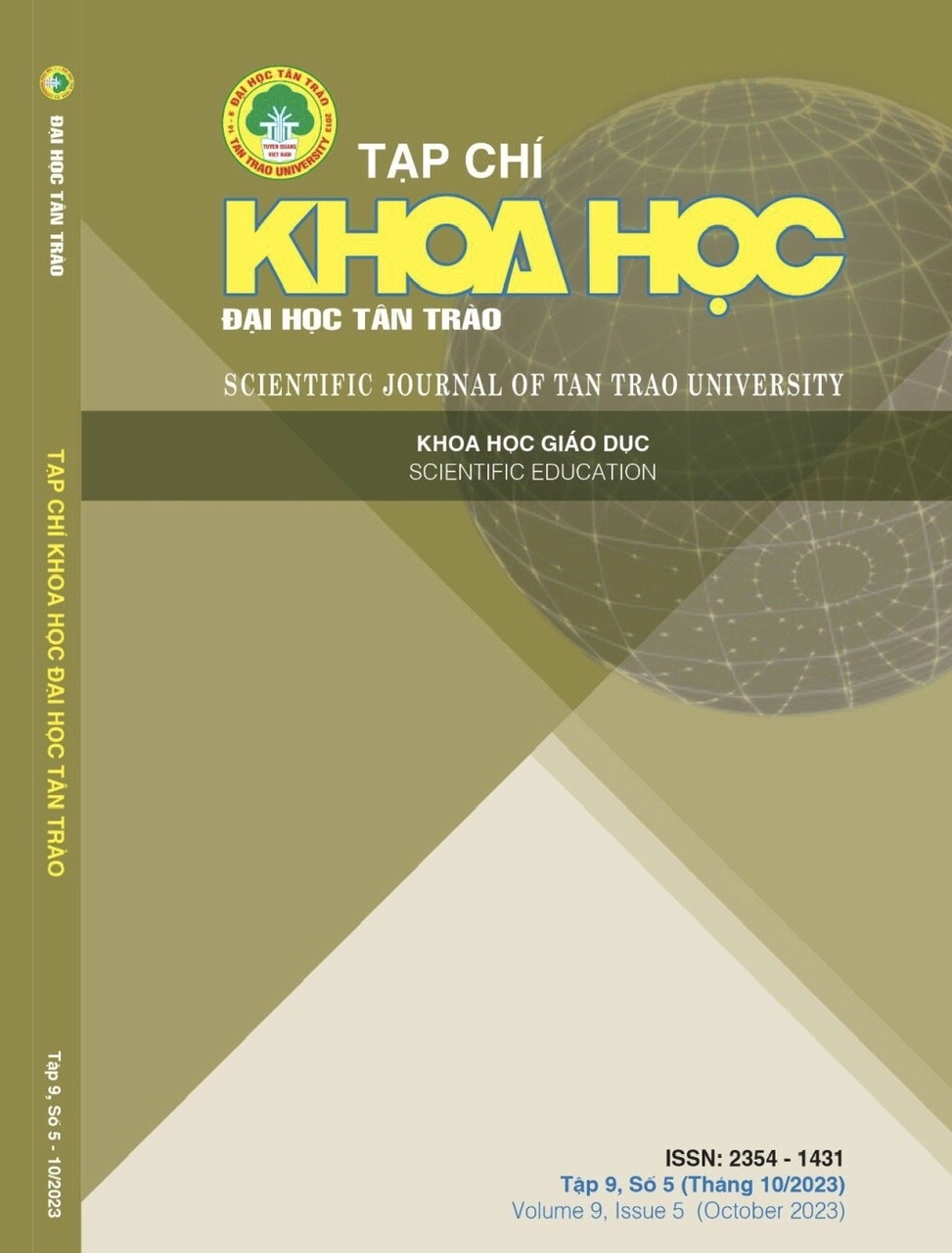PROMOTING EFL HIGH SCHOOL’S STUDENTS AUTONOMY IN CLASSES BY USING PROJECT-BASED LEARNING AS A USEFUL LEARNING TOOL
DOI:
https://doi.org/10.51453/2354-1431/2023/1025Keywords:
Student Autonomy, EFL, PBL, attitudes, effectivenessAbstract
In recent years, the concept of Student Autonomy has been mentioned more and more, especially in the era of rapidly developing technology. When the Covid epidemic broke out, the issue of learners' autonomy became more urgent than ever when students had to study online for a long time. Project-based learning (PBL) has emerged as an effective EFL (English as Foreign Language) method of education curricula in Vietnam. A variety of existing literature proves PBL as a successful technique to develop students’ autonomy. This study investigates the students' attitudes towards PBL activities and show the effectiveness of the PBL activities to help the learners to enhance learner autonomy in EFL's classrooms. Study participants included 50 students of high school grades in EFL classes and 5 EFL teachers. The data collected was from a questionnaire, observation and interviews that conducted by EFL graders. Data revealed that the use of PBL enhanced EFL grade students’ autonomy during learning. In addition, the participants showed a positive attitude towards the PBL applied to this teaching and learning. Based on the findings, several implications for teaching PBL to EFL graders of the EFL classroom have been proposed.
Downloads
References
[1] Benson, P. (2006). Autonomy in language teaching and learning. Language Teaching, 40(1),21- 40.
[2] Camilleri Grima, A. (2007). Pedagogy for autonomy, teachers’ attitudes and institutional change: A case study. In M. Jimenez Raya & L. Sercu (Eds.), Challenges in teacher development: Learner autonomy and intercultural competence. (pp. 81-102). Frankurt: Peter Lang
[3] Chen, H. (2015). The correlations between learner autonomy and the effective factors in college
English learning in China. International Review of Social Sciences and Humanities, 8(2), 70-84.
[4] Cherrington, R. (200). Linguistic imperialism. Byram, M. (ed.). Routledge Encyclopedia of Language Teaching and Learning. London: Routledge, 360-362
[5] Dickinson, L. (1992). Learner autonomy: Learner training language learning. Dublin: Authentic Dickinson, L., 1995. Autonomy, self-direction and self access in language teaching and learning: The history of an idea. System. 23(2): 165-174.
[6] Ha, T. T. D (2007). Nang cao hieu qua giang day tieng Anh o bac dai hoc nhin tu goc do giaovien chu nhiem.
[7] Holec, H. (1981). Autonomy and foreign language learning. Oxford: Pergamon (2nd ed. [1st ed. 1979]), Strasbourg: Council of Europe.
[8] Little, D. (1991). Learner autonomy: Definitions, issues and problems. Dublin: Authentik
[9] Palfreyman, D. (2003). Introduction: Culture and learner autonomy. In D. Palfreyman & R. C. Smith (Eds.), Learner autonomy across cultures: Language education perspectives (pp. 1- 19). Basingstoke: Palgrave Macmillan
[10] Thuan, P. D. (2018). PBL: From theory to EFL classroom practice. In Proceedings of the 6th International OpenTESOL Conference (Vol. 327).
[11] Tran, C. T., & Le, Q. T.(2022). What is it like learning with an enthusiastic teacher? -A survey on university EFL students. InternationalJournal of TESOL & Education, 2(4), 134-148. https://doi. org/10.54855/ijte.22248
[12] Tran, T. B. T., & Vuong, T. K. (2023). Factors Affecting Learner Autonomy in Tertiary Level English Learning: A Study at Van Lang University. International Journal of TESOL & Education, 3(1), 1-18.
[13] Tran, T.Q., & Duong, T. M. (2020). EFL learners’ perceptions of factors influencing learner autonomy development.Kasetsart Journal of Social Sciences,41(1), 194-199.
Downloads
Published
How to Cite
Issue
Section
License

This work is licensed under a Creative Commons Attribution-ShareAlike 4.0 International License.
All articles published in SJTTU are licensed under a Creative Commons Attribution-ShareAlike 4.0 International (CC BY-SA) license. This means anyone is free to copy, transform, or redistribute articles for any lawful purpose in any medium, provided they give appropriate attribution to the original author(s) and SJTTU, link to the license, indicate if changes were made, and redistribute any derivative work under the same license.
Copyright on articles is retained by the respective author(s), without restrictions. A non-exclusive license is granted to SJTTU to publish the article and identify itself as its original publisher, along with the commercial right to include the article in a hardcopy issue for sale to libraries and individuals.
Although the conditions of the CC BY-SA license don't apply to authors (as the copyright holder of your article, you have no restrictions on your rights), by submitting to SJTTU, authors recognize the rights of readers, and must grant any third party the right to use their article to the extent provided by the license.


